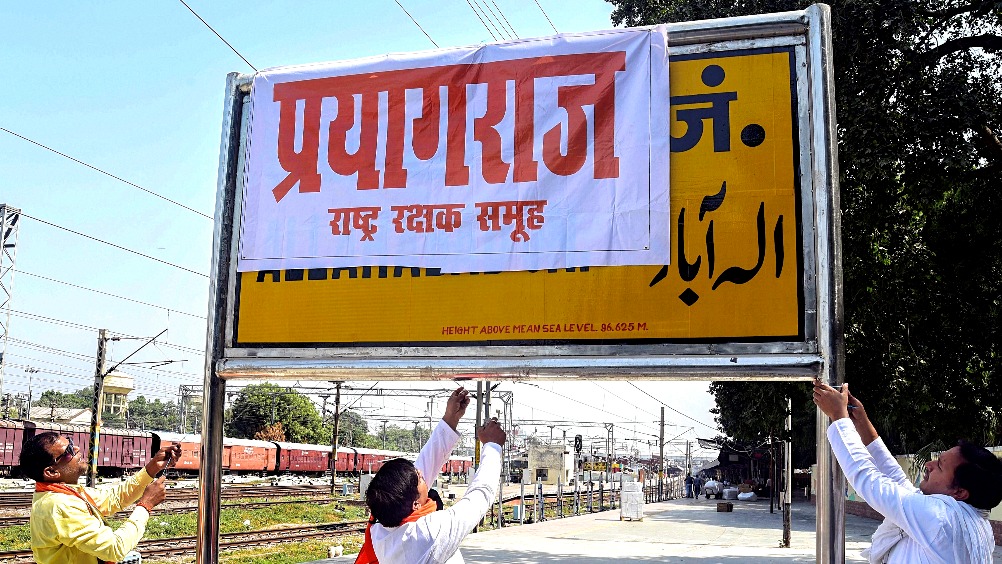Mahatma Gandhi, in an attempt to address casteist oppression, coined the term Harijan to refer to the then ‘untouchables’. He may have believed that a term, which has the name of a divinity as its prefix, could perhaps change the way society viewed that section of underprivileged. But others such as Babasaheb Bhimrao Ambedkar, opposed the move calling it condescending and obscurantist. One question that arose in the context was: “If these were the people of god, what were the others?”
The politics of naming and renaming has always been riddled with uneasy questions. Such questions are rising again as the government at Centre and states such as Uttar Pradesh have taken to renaming cities and streets with the agenda of ‘de-Mughalisation’. In Yogi Adityanath’s UP, Allahabad has again become Prayagraj. It is reported that there is demand that the Bareilly airport be renamed as Nath Nagri and the Agra airport be renamed after Deendayal Upadhyaya. There is also a call to rename Agra as Agravan or Agrawal. The Gujarat government is reportedly thinking of renaming Ahmedabad as Karnavati.
Renaming of cities is nothing new in India. In recent history, the country has seen Bombay become Mumbai, Madras become Chennai, Calcutta become Kolkata, so on and so forth. Cities have been renamed around the globe for different reasons. St Petersburg in imperial Russia was renamed Petrograd when the world went to war first in 1914, as authorities felt the name sounded too German. Petrograd was renamed Leningrad in 1924 after USSR was formed and in memory of Lenin. In 1991, the city was again renamed St Petersburg as the Soviet Union collapsed. In India post Independence, at least in the initial days, cities were renamed primarily to reflect the Indian pronunciation of their names. Trivandrum or Calicut in Kerala, for instance, were British mispronunciations of the native names Thiruvananthapuram and Kozhikode. These were sounds unfamiliar to the British, who anglicised them for their own comfort. But the natives continued to refer to their cities by their original names, which is why the change of name seemed justified. Uttar Pradesh has also seen similar changes with places such as Kanpur, which were known to the British as Cawnpore. Jubbulpore in Madhya Pradesh is Jabalpur today.
In the case of Allahabad and Faizabad, though, their English names do not sound greatly distorted from the way they are pronounced in the native language. The vast majority of Indians has known and will continue to remember these cities as Allahabad and Faizabad despite the renaming just as the name Prayagraj had not disappeared from the minds of people although centuries have passed since the place got renamed as Allahabad. The ancient name has had space in public in various forms — a train name for instance.
The trouble with the renaming of these cities is that with it they are also losing a facet of their evolutionary history. A rewind in name is inadequate to wipe out the years of influence that a culture has had on the development of a place. Governments with their stated intention of reviving totems of a long-gone culture are doing disservice to another that has, while starting off as a colonizer, integrated itself with the local culture and become part of the land’s history.
The strength of Indianness lies in the fact that despite the years of colonization, people have not forgotten their pasts. Prayagraj coexisted with Allahabad in peace. There was no need for one to supercede the other as neither disputed the existence of the other. The sole argument in support of the renaming would be that it is a correction of a historical wrong committed by an empire long gone. However, two wrongs cannot make a right. The names are being projected as reminders of a foreign invasion and slavery; perhaps it is for a segment of people. But such remnants cannot be wiped away at one stroke as they are also as much a part of history as the preceding times. In a couple of years or more, people may get accustomed to Prayagraj and Ayodhya or whatever other new names get established in different parts of the country. But the most realistic worry that comes with this political exercise is economics. Taxpayers’ money is being paid out to effect a superficial change that does nothing to forward the common man’s situation in life. The nation sees no progress besides maybe freshly painted nameboards. Governments with visible agenda need to show the taxpayer an account of what such futile exercises cost before they proceed on them. The taxpayer’s consent must be made mandatory for the execution of such initiatives.
Gandhi’s Harijans, who preferred to be called Dalits, a word that the Union government has directed states to avoid in official communication, still largely remain an underprivileged lot. The change in the way they have been called has brought about no meaningful change in the way they have existed. A Dalit by any other name has remained as neglected; a city by any other name will also not be any different unless genuine effort goes into overall uplift.
